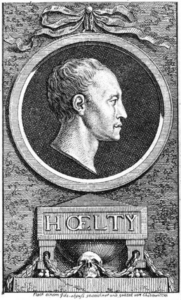Happiness
(Poet's title: Seligkeit)
Set by Schubert:
D 433
[May 1816]
Freuden sonder Zahl
Blühn im Himmelssaal
Engeln und Verklärten,
Wie die Väter lehrten.
O da möcht ich sein,
Und mich ewig freun!
Jedem lächelt traut
Eine Himmelsbraut.
Harf und Psalter klinget,
Und man tanzt und singet.
O da möcht ich sein,
Und mich ewig freun.
Lieber bleib ich hier,
Lächelt Laura mir
Einen Blick, der saget,
Dass ich ausgeklaget.
Selig dann mit Ihr,
Bleib ich ewig hier!
Countless joys
Blossom in Heaven’s Hall
For angels and those who have been transfigured,
As the Fathers used to teach.
Oh, I would like to be there
And enjoy myself forever!
Each person receives a special smile
From a heavenly bride;
Harp and psaltery ring out,
And there is singing and dancing.
Oh, I would like to be there
And enjoy myself forever!
But I would rather remain here
If Laura smiled on me
With a look that says
That I can stop lamenting.
I would then be in bliss with her
And remain here forever!
All translations into English that appear on this website, unless otherwise stated, are by Malcolm Wren. You are free to use them on condition that you acknowledge Malcolm Wren as the translator and schubertsong.uk as the source. Unless otherwise stated, the comments and essays that appear after the texts and translations are by Malcolm Wren and are © Copyright.
☙
Themes and images in this text:
Angels Dancing Eternity Flowers Gazes, glimpses and glances Harps and Aeolian harps Heaven, the sky Joy Laurel Songs (general)
Hölty wrote the first version of this poem as his contribution to the 25th meeting of a group of students at the University of Göttingen. The Göttinger Hainbund had been founded five months previously, on 12th September 1772, and was dedicated to respect for nature and opposition to artifice and formulaic emptiness in literature. The founder members (including Voß, who later revised the poem when he edited Hölty´s collected works) expressed particular veneration for Klopstock, a serious Christian writer.
It is therefore rather odd that the overall tone of ‘Seligkeit’ should be slightly ironic and perhaps even critical of conventional piety. The title itself perhaps refers to the Beatitudes, the passage in the Sermon on the Mount where Jesus explains who is ‘blessed’ or ‘happy’ (‘selig’ in Luther’s German translation of the New Testament), e.g. ‘Blessed are the poor in spirit, for theirs is the kingdom of heaven’ (‘Selig sind, die da geistlich arm sind; denn das Himmelreich ist ihr.’), Matthew 5:3. The poet acknowledges that the angels and the saints are therefore ‘blessed’ in heaven, but reminds us that this is according to the teaching of the Church Fathers. There is a hint of the writer distancing himself from the traditional doctrine. Similarly, the dancing and singing (accompanied by harps and psalteries) in heaven sounds delightful, but the poet goes on to say that life on earth would be preferable if it could be spent with Laura.
The fellow members of the Göttinger Hainbund (‘the Göttingen Grove Alliance’) might have interpreted Laura as a symbol of all that is down to earth and natural (laurel bushes grow in ‘groves’ after all), but they would also have been aware that she is herself a literary conceit (harking back to Petrarch, and even beyond him to the laurel wreaths of antiquity).
Nevertheless, Graham Johnson (Franz Schubert. The Complete Songs Yale University Press, 2014 Vol. III page 129) defends the overall sincerity of the poem and argues that it represents a healthy acceptance of reality rather than relying on fantasy to fulfil our hopes for happiness: “The wry philosophy has its explosive implications for the dangers of modern life. Even if the singer has been promised an array of virgins in the afterlife he would be well advised to calm down and keep hold of a living person he can be sure of.”
☙
Original Spelling and note on the text Seligkeit Freuden sonder Zahl Blühn im Himmelssaal Engeln und Verklärten, Wie die Väter lehrten. O da möcht ich sein, Und mich ewig freun1! Jedem lächelt traut Eine Himmelsbraut; Harf' und Psalter klinget, Und man tanzt und singet. O da möcht' ich sein, Und mich ewig freun! Lieber bleib' ich hier, Lächelt Laura mir Einen Blick, der saget, Daß ich ausgeklaget. Selig dann mit Ihr, Bleib' ich ewig hier! 1 Schubert changed 'Und mich freun, mich freun' (And enjoy myself, enjoy myself) to 'Und mich ewig freun' (And enjoy myself forever).
Confirmed by Peter Rastl with Schubert’s source, Gedichte von L. H. Ch. Hölty. Neu besorgt und vermehrt von Johann Heinrich Voß. Wien, 1815. Bey Chr. Kaulfuß und C. Armbruster. Gedruckt bey Anton Strauß. Meisterwerke deutscher Dichter und Prosaisten. Drittes Bändchen. page 157; and with Gedichte von Ludewig Heinrich Christoph Hölty. Neu besorgt und vermehrt von Johann Heinrich Voss. Hamburg, bei Carl Ernst Bohn. 1804, pages 191-192.
This is the version of Hölty’s poem heavily reworked by Voß.
To see an early edition of the text, go to page 157 [235 von 300] here: http://digital.onb.ac.at/OnbViewer/viewer.faces?doc=ABO_%2BZ15769170X


